仁爱版英语八年级下Unit 6 Enjoying CyclingTopic 1 We're going on a three-day visit to Mount Tai.期中复习课件(49张PPT)
文档属性
| 名称 | 仁爱版英语八年级下Unit 6 Enjoying CyclingTopic 1 We're going on a three-day visit to Mount Tai.期中复习课件(49张PPT) | 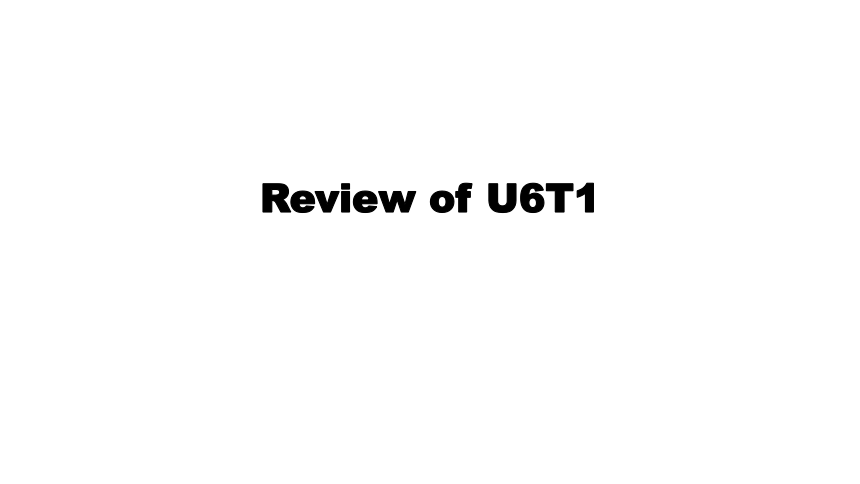 | |
| 格式 | zip | ||
| 文件大小 | 3.8MB | ||
| 资源类型 | 教案 | ||
| 版本资源 | 仁爱科普版 | ||
| 科目 | 英语 | ||
| 更新时间 | 2020-04-26 22:57:12 | ||
图片预览



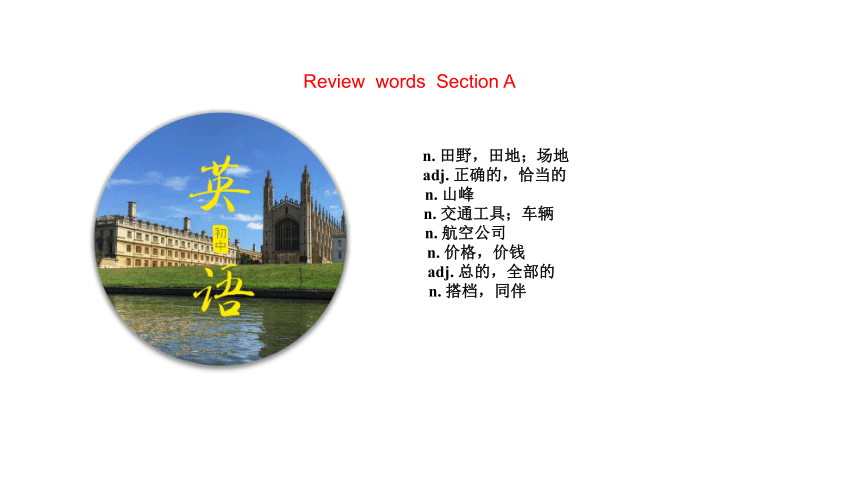
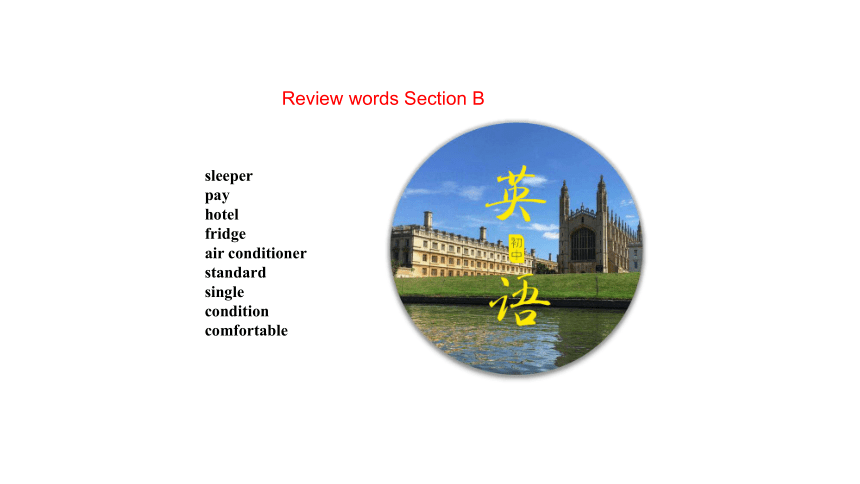
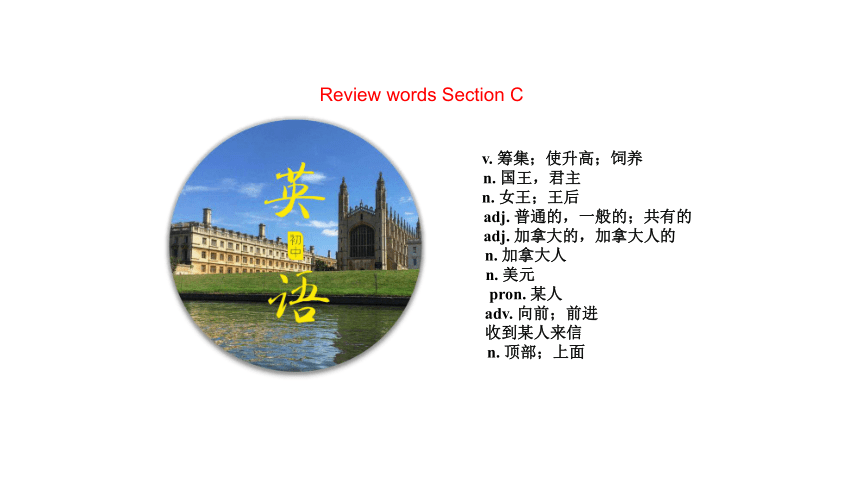
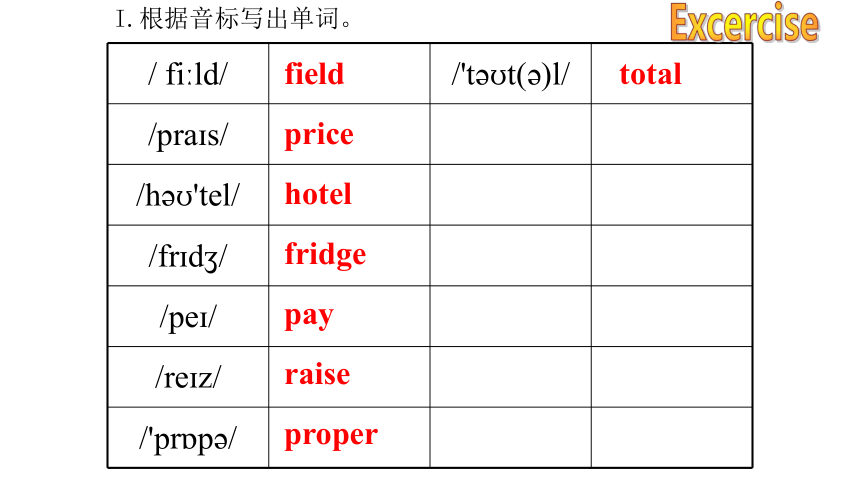
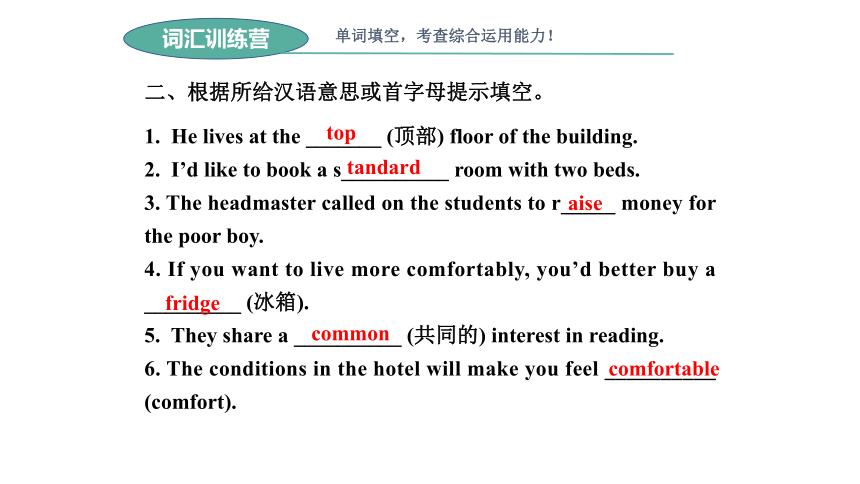
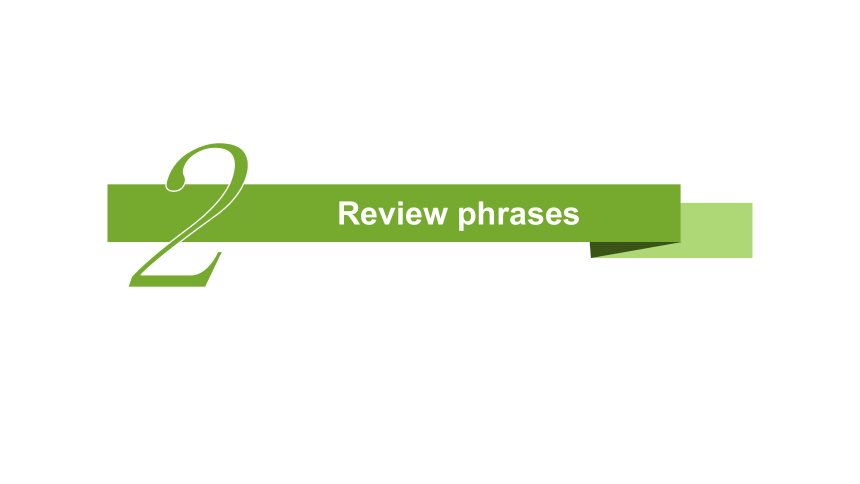
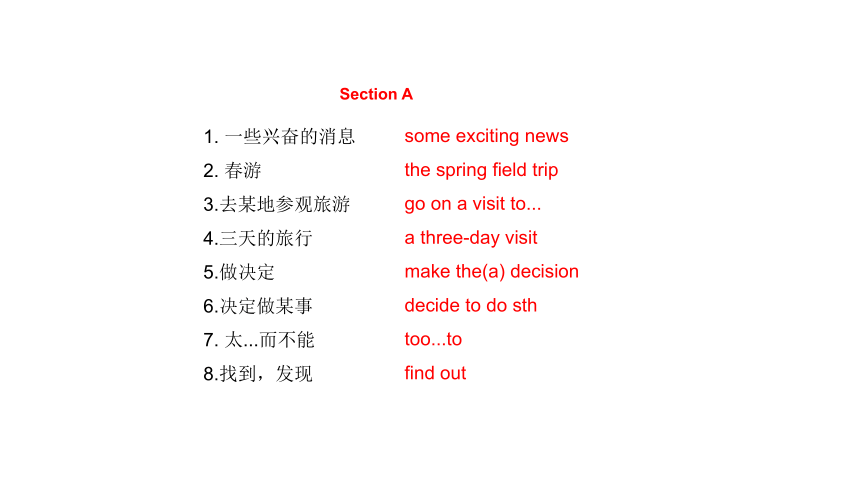

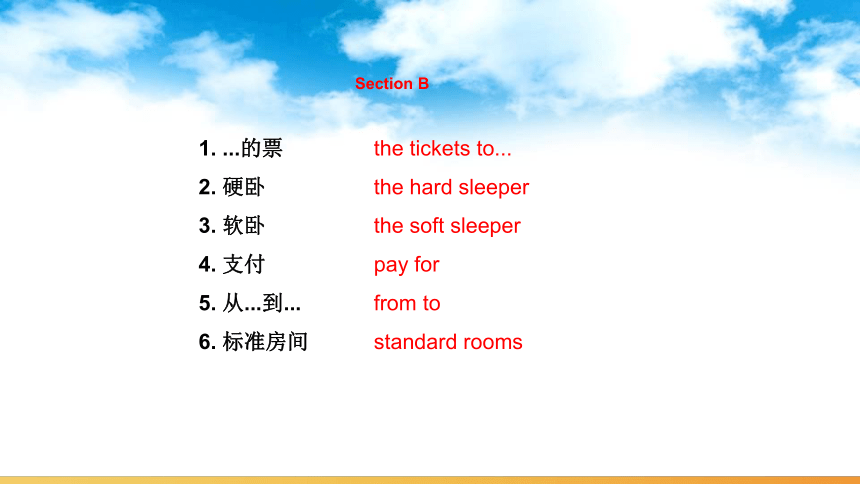
文档简介
(共49张PPT)
Review of U6T1
1. Review Words
2. Review Phrases
3. Review Sentences Types
4. Review Grammar
5. Review Writing
Review Words
field n. 田野,田地;场地
proper adj. 正确的,恰当的
mount n. 山峰
vehicle n. 交通工具;车辆
airline n. 航空公司
price n. 价格,价钱
total adj. 总的,全部的
partner n. 搭档,同伴
Review words Section A
sleeper n. 卧铺列车
pay v. 付费,付酬
hotel n. 宾馆,旅店,饭店
fridge n. 冰箱
air conditioner n. 空调
standard adj. 标准的 n. 标准
single adj. 单一的, 单个的
condition n. 条件,状况
comfortable adj. 舒服的;安逸的
Review words Section B
raise v. 筹集;使升高;饲养
king n. 国王,君主
queen n. 女王;王后
common adj. 普通的,一般的;共有的
Canadian adj. 加拿大的,加拿大人的
n. 加拿大人
dollar n. 美元
somebody pron. 某人
forward adv. 向前;前进
hear from 收到某人来信
top n. 顶部;上面
Review words Section C
I.根据音标写出单词。
field
price
hotel
fridge
pay
raise
proper
total
/ fi?ld/ /'t??t(?)l/
/pra?s/
/h??'tel/
/fr?d?/
/pe?/
/re?z/
/'pr?p?/
单词填空,考查综合运用能力!
1. He lives at the _______ (顶部) floor of the building.
2. I’d like to book a s__________ room with two beds.
3. The headmaster called on the students to r_____ money for the poor boy.
4. If you want to live more comfortably, you’d better buy a _________ (冰箱).
5. They share a __________ (共同的) interest in reading.
6. The conditions in the hotel will make you feel __________ (comfort).
二、根据所给汉语意思或首字母提示填空。
top
tandard
aise
fridge
common
comfortable
Review phrases
1. 一些兴奋的消息
2. 春游
3.去某地参观旅游
4.三天的旅行
5.做决定
6.决定做某事
7. 太...而不能
8.找到,发现
some exciting news
the spring field trip
go on a visit to...
a three-day visit
make the(a) decision
decide to do sth
too...to
find out
Section A
9. 乘火车的费用
10. 需要做某事
11.乘飞机
12.通过电话
13.决定,选定
14.做某事的最佳方式
the cost for the train
need to do sth
by plane
over the phone
decide on/upon
the best way to do sth
1. ...的票
2. 硬卧
3. 软卧
4. 支付
5. 从...到...
6. 标准房间
the tickets to...
the hard sleeper
the soft sleeper
pay for
from to
standard rooms
Section B
*
Section C
1.做某事是普遍的 ____________________
2.筹钱 _____________
3.做某事的特殊方法 ____________________
4.想出,认为 __________
5.买一张抽奖劵_____________________
6.某物花费某人多少钱去做某事 __________________________
7.中奖的那个学生_____________________________
8.成为“国王”或“王后” ___________________
9.问候某人 _________
10.用某物做某事 __________________
11.在中午________
12.把某物端给某人____________
special ways to do sth.
It’s common to do sth.
raise money
be the king or queen
think of
buy a ticket for the draw
It costs sb. some money to do sth.
the student with the winning ticket
greet sb.
use sth. to do sth.
at noon
serve sth. to sb.
1. 安全着陆
1.照相
2. 如此……以至于…
3. ……的第三天
4. 在游泳池
5. 最好的朋友
6. 到达山顶
7. 到达某地
land safely
take photos
so.... that...
on the third day of...
in the pool
best friend
get to the top
get to = reach = arrive in (+ 大地点)/at(+小地点)
Section D
翻译下列词组.
收到...的来信
选定,决定
盼望
查明,找出
付款
去...参观
上演
hear from
decide on
look forward to
find out
pay for
go on a visit to
put on
1. a seven-day holiday ____________2.go on a visit to sp. ________
3.decide (not) to do sth. _________4.decide on sth. _____________
5.make a decision ___________6.the best way to do sth. ________
7.over the phone __________8.book the train tickets _______
9.the hard/soft sleeper _____10.raise money ____________
11.borrow sth. from sb. _______12.look forward to doing sth. __
13.lend sth. to sb.=lend sb. sth. _________14.on the first day of ___
一个七天的假期
去……的旅行
决定做…
决定某事
做决定…
做…的最好方法
在电话上
订火车票
硬卧/软卧
筹钱
从某人借……
期望……
借某物给某人
在…的第一天
II. 根据中文提示,将下列句子补充完整。
1. 我们选定最好的方法来提高我们的英语水平。
We have ________ ____the best way to improve
our English.
2. 我盼望着收到你的来信。
I'm looking forward to ____ ________ you.
3. 昨天他查明了去悉尼的费用。
He ___ _____ the cost to Sydney yesterday.
4. 露西付了100美元预定单人房的款项。
Lucy _______ $100 ______ booking a room with one single bed.
5. 为了给这个贫穷的村庄筹钱,昨晚他们表演了一个新的喜剧。
They ____ ____ a new play to raise money for the poor village last night.
decided on
hearing from
found out
paid for
put on
Review Sentences Types
本单元重点句子有哪些?看谁说得多!
1. For our spring field trip, we’re going on a three-day visit to Mount Tai. 这次春游,我们将去泰山玩三天。
① go on a visit意为“去旅游”,visit作名词。
visit 作动词,意为“探望,拜访;参观,游览”。
② a three-day visit意为“一次三天的旅游”,three-day是复合形容词,作定语,其结构为:数词+连字符+单数名同。
⑵a three-day visit “为期三天的旅行”
_________________“两个月的假期”
____________________“一个18岁的男孩”
______________“百米赛跑”
a two-month holiday
an eighteen-year-old boy
a 100-meter race
本单元重点句子有哪些?看谁说得多!
3. Let’s find out some information about the cost. 让我们查一下有关费用的信息。
find out(通过询问、读或看等方式)查明,弄清(情况)。
【链接】find①(意外或偶然地)发现,碰到;②(通过搜寻)找到,找回。
…we’ll decide on the best way to travel on our field trip.
……我们将决定郊游的最好方式。
decide作动词,常用结构decide to do sth.“决定做某事”;
decide on意为“决定,选定”,常用decide on sth.。
本单元重点句子有哪些?看谁说得多!
5. We have tickets at ? 145 for the hard sleeper and ?224 for
the soft sleeper. 我们的票价是硬卧每张145元,软卧每张224
元。
(1) at在句中意为“以……,在……”,一般用在表示价格、比率、年龄、速度等词的前面。
hard sleeper硬卧;soft sleeper软卧。
hard adj. 坚硬的,坚固的。
本单元重点句子有哪些?看谁说得多!
Please pay for the tickets before 5:30 p. m.请在下午5:3
前结清票款。
pay for...为……付钱,for后接表示商品、货物的名词。
①pay的常用句型是:人+ pay +钱+ for +商品货物。
②pay n.工资、报酬。如:high pay 高薪。
7. I’m looking forward to hearing from you.我盼望着收到你的来信。
①look forward to“期待,盼望” ,to是介词,后面接名词或动名词。
②hear from sb.意为“收到……的来信”。
本单元重点句子有哪些?看谁说得多!
9. I was so excited that I didn’t feel cold at all.
我那么兴奋以致于一点没感到寒冷。
so...that…“如此……以致……”。so为副词,修饰形容词或副词,that用来引导结果状语从句。
8. It was snowing when we got to the top.我们到达山顶时正在下雪。
top n. 顶部;(物体的)上面;常用短语是:at/on the top of...在……上部。
拓展:top adj. 最高的,最优秀的。
四个花费 spend,pay,take, cost
。
spent sth
spent sth
paid sth
took sb sth
cost sb sth
cost sb
Sb
Sb
Sb
It
It
sth
(in) doing
on
for
to do
to do
学以致用,你掌握了吗?
一、单项选择。
1. —What will your parents do during the holiday?
—They will go on ____ a visit to Beijing.
seven days B. seven-days
C. seven-day D. seven-days’
2. My parents are trying to _____ a suitable high school for me.
decide on B. decide to
C. depend on D. look up
句型大闯关
C
A
学以致用,你掌握了吗?
3. The foreign visitors are looking forward to ____ Beijing Opera at Haidian Theater.
A. watch B. watches C. watching D. watched
4. —What’s the price of the movie ticket?
—We have tickets ____ ¥35 ____ the front seat.
A. at; for B. at; in C. on; for D. on; in
句型大闯关
C
A
1.Mrs.Lee 25 thousand yuan on the watch.
2.How much did the new car your father?
3.She 5 hundred yuan for the meal.
4.It them more than one year to finish that building.
spent
cost
paid
took
Review Grammar
1.不定式 to do
功能 例句
作主语 It’s important for us to learn English well.
To see is to believe.
作表语 The best way to raise money is to sell flowers.
作宾语 We decide to take the train.
作宾补 Miss Wang asked Kangkang to book the tickets.
作定语 I have some exciting news to tell you.
作状语 Why don’t we put on a show to raise money?
动词不定式:
1. 作主语
动词不定式作主语时,为了保持句子平衡,常用it作形式主语,而将真正的主语——动词不定式后置。其常用句型为: It’s +adj. +(of/for sb.) to do sth.。
e. g. ⑴_________________________ the environment.
“保护环境对于我们来说是很重要的。”
⑵______________________“你帮助我真是太好了。”
It’s important for us to protect
It’s kind of you to help me.
【温馨提示】
如果句子中作表语的形容词表示事物的性质,如important, necessary, possible,easy, difficult, hard,heavy等,用for引出;
如果句中的形容词表示人的特征、品德或意愿,如 kind,honest, careless, lazy, stupid, clever, foolish,polite, bad等,则用of 引出。
2. It’s+名词(或名词短语)(a pleasure, a pity, a pleasant thing, one’s duty,an honor, a shame, a good place, no easy job ...)+ to do sth.
It’s a pity to miss the early bus. 惋惜的是错过了早班车。
It’s our duty to clean the classroom every day. 每天打扫教室是我们的义务。
即: It’s adj for sb. to do sth.
即: It’s adj of sb. to do sth.
2.作表语
动词不定式可作表语,说明主语的具体内容。也常表示将来的动作,主语常常是表示意向、打算、计划的词。如wish, dream, idea, task, purpose, duty, job等。
e. g.
My dream is to become a pilot in the future.
我的梦想就是将来当一名飞行员。
The best way to raise money is _______________.
“筹钱的最好方法就是卖报纸。”
to sell newspapers
3.作宾语
(1)一些动词后常跟动词不定式作宾语,这类动词有afford, agree, decide, fail, hope, learn, try, plan, refuse, want等。
e. g. ______________________________
“我打算下个月去杭州参观。”
(2)在find, think等后跟动词不定式作宾语时,常用it作形式宾语,而将真正的宾语——动词不定式后置。
e. g. ______________________________
“我发现画画很有趣。”
I plan to visit Hangzhou next month.
I find it interesting to draw pictures.
4. 作宾语补足语
(1)一些动词后常跟动词不定式作宾语补足语, 这类动词有 advise, ask, invite, order, teach, tell, want等。
e. g. ____________________________________
“我爸爸去年教我骑自行车。”
(2)使役动词(如make, let等)及感官动词(如see, hear, feel, watch等)后常跟不带to的动词不定式作宾语补足语。
e. g. _________________________ on the playground after school. “我经常看到他放学后在操场上打篮球。”
My father taught me to ride a bike last year.
I often see him play basketball
5. 作定语
动词不定式作定语, 通常放在所修饰词之后。它与所修饰的词可以是主谓关系,也可以是动宾关系。说明被修饰词的特征。
e. g. Would you like something _____?
“你想要一些吃的东西吗?”
温馨提示:动词不定式与所修饰的词为动宾关系,且动词为不及物动词时,后面要加上相应的介词。
e. g. I need a pen __________. “我需要一支钢笔写字。”
to eat
to write with
6. 动词不定式作状语。不定式用作状语主要表示目的、结果和原因,其逻辑主语通常要和句子的主语一致。
(1) 用作目的状语
He went to see his teacher this morning. 今天上午他去看望他的老师了。
(2) 用作结果状语
The police searched the room to find nothing.
警察搜查这个房间,什么也没有找到。
The ice is thick enough to walk on. 冰很厚,能够在上面行走。
(3) 用作原因状语
I’m sorry to hear your mother is ill. 听到你妈妈生病了我很难过。
7. 动词不定式的否定形式。
不定式的否定式通常是将否定词not或never置于不定式之前,即构成not to do 或never to do 。
He told me not to open the door. 他让我别开门。
Take care not to break the glass. 小心别把玻璃杯打碎了。
I promise never to smoke again. 我保证再也不抽烟了。
【温馨提示】不带to的不定式就直接在动词原形前面加上not。如:
The teacher made us not play computer games in class.
老师让我们不要在课堂上玩游戏。
1.I have exciting news (tell) you.
2.It is very common (raise)money in
Canadian and American schools.
3.I want (make) a hotel reservation.
4.The best way to raise money is
(sell)newspaper.
5.Helen helps us (book)the train tickets .
6.The funny man made us (laugh).
7.Let's (decide)on the best way to
go there.
8.I don't know how (get)to the station.
to tell
to raise
to make
to sell
(to) book
laugh
decide
to get
Review Texts
The students will go on a __________ visit to Mount Tai. Michael wants to _______ there, and it will ______ them a few days. So it’s _______ far for them ____ go there by bike. Miss Wang asks them to make the ________ together. There are other __________for them to choose. Miss Wang wants them to find out the _______ for train, bus and plane. They will _____ ____ the best way to go on their ______ ______.
Fill in the blanks according to Section A 1a.
three-day
cycle
take
decision
vehicles
cost
decide on
field trip
too
to
Li Weikang is booking some tickets from ________ to ________ on the phone. He needs 21 ______ ______ tickets and they cost _______ yuan together. The train leaves at _______ a.m. and ______ _____ Taishan Railway Station at 6:17 p.m. Li Weikang’s _______ ________ is 8250-2448.
Read Section B 1a and fill in the blanks
Beijing
Mount Tai
hard sleeper
3,045
11:15
arrives
telephone number
at
*
It is very ________ to raise money in Canadian and American _________. Students, teachers and parents have many ______ ______ to raise money for _____ _______. Some schools think of ______ ______, such as “ King or Queen for a Day”. It costs each student _____ ______ to buy a ticket for _____ ______. After all the tickets _____ ______, one ticket _____ ______. The student with the _______ _______ will be the ______ or ______ for the next school day. When the student arrives in the morning, the headmaster _____ him or her and ______ the student’s _______. The student _______ in the headmaster’s _______ for the day and even can ______ the headmaster’s ______ ______ to call home. At noon, the headmaster and other teachers ______ a special lunch and ______ it to the student.
common
special ways
great ideas
one dollar
the draw
schools
field trip
are
sold
is drawn
winning ticket
king queen
greets
carries
books
sits
chair
use
mobile phone
order
serve
Read Section C 1a and fill in the blanks
*
Write a passage to describe one of your favorite trips.
___________________________________________________________________________________________________________________________________________________________________________________________________
Section D
Writing skills:
1.Tense(时态):
2.Outline(大纲):
以 一般过去时为主
Written work
Write a passage about one of your favorite trip ,the following words may help you.
Last…,I ……I went there…….The weather was….
On the first day ….,On the second day …,On the last day …The most interesting thing …..
I felt ….
Last week, I visited Beijing.
I was so excited that I couldn’t fall asleep last Sunday night. I got up early and put a camera, some clothes, a map and so on in my bag. It took me about 35 hours to get there by train.
I visited many places of interest such as the Great Wall, the Ming Tombs, Tian’anmen Square, the Temple of Heaven and the Summer Palace. I enjoyed myself very much because they are so beautiful.
I felt tired but excited because I learned a lot about the history of this beautiful city.
( )1. I have something interesting you.
A. telling B. tell C. to tell
( )2. It’s impossible for us ___ there in two hours.
A. to get B. get C. getting
( )3. —Though Mike is ____ boy, he can say many words. —How clever!
A. an-one-year-oldB. a one-year-old
C. a one-year old D. an one-year old
( )4. —Why do the students collect the bottles?
—Because they want to ____ money and help the poor children.
A. raise B. borrow C. sell
( )5. —I’ll go on a visit to Mount Huang. —____
A. Thank you. B. Have a good trip! C. Never mind.
C
A
B
A
B
( )6. —Shall we go on a field trip to Tenglong Cave by bike?
—No. It’s ____ far ____ cycle. Let’s choose other vehicles.
A. too; to B. so; to C. too; not to
( )7. The foreign visitors are looking forward to ____ Beijing Opera at Haidian Theater.
A. watch B. watches C. watching
( )8. I think the best way Beijing is by plane.
A. get to B. to get to C. getting
( )9. It me half an hour to climb up the mountain last week.
A. cost B. takes C. took
( )10. The movie is interesting that I want to watch it again.
A. very B. so C. too
A
C
B
C
B
Review of U6T1
1. Review Words
2. Review Phrases
3. Review Sentences Types
4. Review Grammar
5. Review Writing
Review Words
field n. 田野,田地;场地
proper adj. 正确的,恰当的
mount n. 山峰
vehicle n. 交通工具;车辆
airline n. 航空公司
price n. 价格,价钱
total adj. 总的,全部的
partner n. 搭档,同伴
Review words Section A
sleeper n. 卧铺列车
pay v. 付费,付酬
hotel n. 宾馆,旅店,饭店
fridge n. 冰箱
air conditioner n. 空调
standard adj. 标准的 n. 标准
single adj. 单一的, 单个的
condition n. 条件,状况
comfortable adj. 舒服的;安逸的
Review words Section B
raise v. 筹集;使升高;饲养
king n. 国王,君主
queen n. 女王;王后
common adj. 普通的,一般的;共有的
Canadian adj. 加拿大的,加拿大人的
n. 加拿大人
dollar n. 美元
somebody pron. 某人
forward adv. 向前;前进
hear from 收到某人来信
top n. 顶部;上面
Review words Section C
I.根据音标写出单词。
field
price
hotel
fridge
pay
raise
proper
total
/ fi?ld/ /'t??t(?)l/
/pra?s/
/h??'tel/
/fr?d?/
/pe?/
/re?z/
/'pr?p?/
单词填空,考查综合运用能力!
1. He lives at the _______ (顶部) floor of the building.
2. I’d like to book a s__________ room with two beds.
3. The headmaster called on the students to r_____ money for the poor boy.
4. If you want to live more comfortably, you’d better buy a _________ (冰箱).
5. They share a __________ (共同的) interest in reading.
6. The conditions in the hotel will make you feel __________ (comfort).
二、根据所给汉语意思或首字母提示填空。
top
tandard
aise
fridge
common
comfortable
Review phrases
1. 一些兴奋的消息
2. 春游
3.去某地参观旅游
4.三天的旅行
5.做决定
6.决定做某事
7. 太...而不能
8.找到,发现
some exciting news
the spring field trip
go on a visit to...
a three-day visit
make the(a) decision
decide to do sth
too...to
find out
Section A
9. 乘火车的费用
10. 需要做某事
11.乘飞机
12.通过电话
13.决定,选定
14.做某事的最佳方式
the cost for the train
need to do sth
by plane
over the phone
decide on/upon
the best way to do sth
1. ...的票
2. 硬卧
3. 软卧
4. 支付
5. 从...到...
6. 标准房间
the tickets to...
the hard sleeper
the soft sleeper
pay for
from to
standard rooms
Section B
*
Section C
1.做某事是普遍的 ____________________
2.筹钱 _____________
3.做某事的特殊方法 ____________________
4.想出,认为 __________
5.买一张抽奖劵_____________________
6.某物花费某人多少钱去做某事 __________________________
7.中奖的那个学生_____________________________
8.成为“国王”或“王后” ___________________
9.问候某人 _________
10.用某物做某事 __________________
11.在中午________
12.把某物端给某人____________
special ways to do sth.
It’s common to do sth.
raise money
be the king or queen
think of
buy a ticket for the draw
It costs sb. some money to do sth.
the student with the winning ticket
greet sb.
use sth. to do sth.
at noon
serve sth. to sb.
1. 安全着陆
1.照相
2. 如此……以至于…
3. ……的第三天
4. 在游泳池
5. 最好的朋友
6. 到达山顶
7. 到达某地
land safely
take photos
so.... that...
on the third day of...
in the pool
best friend
get to the top
get to = reach = arrive in (+ 大地点)/at(+小地点)
Section D
翻译下列词组.
收到...的来信
选定,决定
盼望
查明,找出
付款
去...参观
上演
hear from
decide on
look forward to
find out
pay for
go on a visit to
put on
1. a seven-day holiday ____________2.go on a visit to sp. ________
3.decide (not) to do sth. _________4.decide on sth. _____________
5.make a decision ___________6.the best way to do sth. ________
7.over the phone __________8.book the train tickets _______
9.the hard/soft sleeper _____10.raise money ____________
11.borrow sth. from sb. _______12.look forward to doing sth. __
13.lend sth. to sb.=lend sb. sth. _________14.on the first day of ___
一个七天的假期
去……的旅行
决定做…
决定某事
做决定…
做…的最好方法
在电话上
订火车票
硬卧/软卧
筹钱
从某人借……
期望……
借某物给某人
在…的第一天
II. 根据中文提示,将下列句子补充完整。
1. 我们选定最好的方法来提高我们的英语水平。
We have ________ ____the best way to improve
our English.
2. 我盼望着收到你的来信。
I'm looking forward to ____ ________ you.
3. 昨天他查明了去悉尼的费用。
He ___ _____ the cost to Sydney yesterday.
4. 露西付了100美元预定单人房的款项。
Lucy _______ $100 ______ booking a room with one single bed.
5. 为了给这个贫穷的村庄筹钱,昨晚他们表演了一个新的喜剧。
They ____ ____ a new play to raise money for the poor village last night.
decided on
hearing from
found out
paid for
put on
Review Sentences Types
本单元重点句子有哪些?看谁说得多!
1. For our spring field trip, we’re going on a three-day visit to Mount Tai. 这次春游,我们将去泰山玩三天。
① go on a visit意为“去旅游”,visit作名词。
visit 作动词,意为“探望,拜访;参观,游览”。
② a three-day visit意为“一次三天的旅游”,three-day是复合形容词,作定语,其结构为:数词+连字符+单数名同。
⑵a three-day visit “为期三天的旅行”
_________________“两个月的假期”
____________________“一个18岁的男孩”
______________“百米赛跑”
a two-month holiday
an eighteen-year-old boy
a 100-meter race
本单元重点句子有哪些?看谁说得多!
3. Let’s find out some information about the cost. 让我们查一下有关费用的信息。
find out(通过询问、读或看等方式)查明,弄清(情况)。
【链接】find①(意外或偶然地)发现,碰到;②(通过搜寻)找到,找回。
…we’ll decide on the best way to travel on our field trip.
……我们将决定郊游的最好方式。
decide作动词,常用结构decide to do sth.“决定做某事”;
decide on意为“决定,选定”,常用decide on sth.。
本单元重点句子有哪些?看谁说得多!
5. We have tickets at ? 145 for the hard sleeper and ?224 for
the soft sleeper. 我们的票价是硬卧每张145元,软卧每张224
元。
(1) at在句中意为“以……,在……”,一般用在表示价格、比率、年龄、速度等词的前面。
hard sleeper硬卧;soft sleeper软卧。
hard adj. 坚硬的,坚固的。
本单元重点句子有哪些?看谁说得多!
Please pay for the tickets before 5:30 p. m.请在下午5:3
前结清票款。
pay for...为……付钱,for后接表示商品、货物的名词。
①pay的常用句型是:人+ pay +钱+ for +商品货物。
②pay n.工资、报酬。如:high pay 高薪。
7. I’m looking forward to hearing from you.我盼望着收到你的来信。
①look forward to“期待,盼望” ,to是介词,后面接名词或动名词。
②hear from sb.意为“收到……的来信”。
本单元重点句子有哪些?看谁说得多!
9. I was so excited that I didn’t feel cold at all.
我那么兴奋以致于一点没感到寒冷。
so...that…“如此……以致……”。so为副词,修饰形容词或副词,that用来引导结果状语从句。
8. It was snowing when we got to the top.我们到达山顶时正在下雪。
top n. 顶部;(物体的)上面;常用短语是:at/on the top of...在……上部。
拓展:top adj. 最高的,最优秀的。
四个花费 spend,pay,take, cost
。
spent sth
spent sth
paid sth
took sb sth
cost sb sth
cost sb
Sb
Sb
Sb
It
It
sth
(in) doing
on
for
to do
to do
学以致用,你掌握了吗?
一、单项选择。
1. —What will your parents do during the holiday?
—They will go on ____ a visit to Beijing.
seven days B. seven-days
C. seven-day D. seven-days’
2. My parents are trying to _____ a suitable high school for me.
decide on B. decide to
C. depend on D. look up
句型大闯关
C
A
学以致用,你掌握了吗?
3. The foreign visitors are looking forward to ____ Beijing Opera at Haidian Theater.
A. watch B. watches C. watching D. watched
4. —What’s the price of the movie ticket?
—We have tickets ____ ¥35 ____ the front seat.
A. at; for B. at; in C. on; for D. on; in
句型大闯关
C
A
1.Mrs.Lee 25 thousand yuan on the watch.
2.How much did the new car your father?
3.She 5 hundred yuan for the meal.
4.It them more than one year to finish that building.
spent
cost
paid
took
Review Grammar
1.不定式 to do
功能 例句
作主语 It’s important for us to learn English well.
To see is to believe.
作表语 The best way to raise money is to sell flowers.
作宾语 We decide to take the train.
作宾补 Miss Wang asked Kangkang to book the tickets.
作定语 I have some exciting news to tell you.
作状语 Why don’t we put on a show to raise money?
动词不定式:
1. 作主语
动词不定式作主语时,为了保持句子平衡,常用it作形式主语,而将真正的主语——动词不定式后置。其常用句型为: It’s +adj. +(of/for sb.) to do sth.。
e. g. ⑴_________________________ the environment.
“保护环境对于我们来说是很重要的。”
⑵______________________“你帮助我真是太好了。”
It’s important for us to protect
It’s kind of you to help me.
【温馨提示】
如果句子中作表语的形容词表示事物的性质,如important, necessary, possible,easy, difficult, hard,heavy等,用for引出;
如果句中的形容词表示人的特征、品德或意愿,如 kind,honest, careless, lazy, stupid, clever, foolish,polite, bad等,则用of 引出。
2. It’s+名词(或名词短语)(a pleasure, a pity, a pleasant thing, one’s duty,an honor, a shame, a good place, no easy job ...)+ to do sth.
It’s a pity to miss the early bus. 惋惜的是错过了早班车。
It’s our duty to clean the classroom every day. 每天打扫教室是我们的义务。
即: It’s adj for sb. to do sth.
即: It’s adj of sb. to do sth.
2.作表语
动词不定式可作表语,说明主语的具体内容。也常表示将来的动作,主语常常是表示意向、打算、计划的词。如wish, dream, idea, task, purpose, duty, job等。
e. g.
My dream is to become a pilot in the future.
我的梦想就是将来当一名飞行员。
The best way to raise money is _______________.
“筹钱的最好方法就是卖报纸。”
to sell newspapers
3.作宾语
(1)一些动词后常跟动词不定式作宾语,这类动词有afford, agree, decide, fail, hope, learn, try, plan, refuse, want等。
e. g. ______________________________
“我打算下个月去杭州参观。”
(2)在find, think等后跟动词不定式作宾语时,常用it作形式宾语,而将真正的宾语——动词不定式后置。
e. g. ______________________________
“我发现画画很有趣。”
I plan to visit Hangzhou next month.
I find it interesting to draw pictures.
4. 作宾语补足语
(1)一些动词后常跟动词不定式作宾语补足语, 这类动词有 advise, ask, invite, order, teach, tell, want等。
e. g. ____________________________________
“我爸爸去年教我骑自行车。”
(2)使役动词(如make, let等)及感官动词(如see, hear, feel, watch等)后常跟不带to的动词不定式作宾语补足语。
e. g. _________________________ on the playground after school. “我经常看到他放学后在操场上打篮球。”
My father taught me to ride a bike last year.
I often see him play basketball
5. 作定语
动词不定式作定语, 通常放在所修饰词之后。它与所修饰的词可以是主谓关系,也可以是动宾关系。说明被修饰词的特征。
e. g. Would you like something _____?
“你想要一些吃的东西吗?”
温馨提示:动词不定式与所修饰的词为动宾关系,且动词为不及物动词时,后面要加上相应的介词。
e. g. I need a pen __________. “我需要一支钢笔写字。”
to eat
to write with
6. 动词不定式作状语。不定式用作状语主要表示目的、结果和原因,其逻辑主语通常要和句子的主语一致。
(1) 用作目的状语
He went to see his teacher this morning. 今天上午他去看望他的老师了。
(2) 用作结果状语
The police searched the room to find nothing.
警察搜查这个房间,什么也没有找到。
The ice is thick enough to walk on. 冰很厚,能够在上面行走。
(3) 用作原因状语
I’m sorry to hear your mother is ill. 听到你妈妈生病了我很难过。
7. 动词不定式的否定形式。
不定式的否定式通常是将否定词not或never置于不定式之前,即构成not to do 或never to do 。
He told me not to open the door. 他让我别开门。
Take care not to break the glass. 小心别把玻璃杯打碎了。
I promise never to smoke again. 我保证再也不抽烟了。
【温馨提示】不带to的不定式就直接在动词原形前面加上not。如:
The teacher made us not play computer games in class.
老师让我们不要在课堂上玩游戏。
1.I have exciting news (tell) you.
2.It is very common (raise)money in
Canadian and American schools.
3.I want (make) a hotel reservation.
4.The best way to raise money is
(sell)newspaper.
5.Helen helps us (book)the train tickets .
6.The funny man made us (laugh).
7.Let's (decide)on the best way to
go there.
8.I don't know how (get)to the station.
to tell
to raise
to make
to sell
(to) book
laugh
decide
to get
Review Texts
The students will go on a __________ visit to Mount Tai. Michael wants to _______ there, and it will ______ them a few days. So it’s _______ far for them ____ go there by bike. Miss Wang asks them to make the ________ together. There are other __________for them to choose. Miss Wang wants them to find out the _______ for train, bus and plane. They will _____ ____ the best way to go on their ______ ______.
Fill in the blanks according to Section A 1a.
three-day
cycle
take
decision
vehicles
cost
decide on
field trip
too
to
Li Weikang is booking some tickets from ________ to ________ on the phone. He needs 21 ______ ______ tickets and they cost _______ yuan together. The train leaves at _______ a.m. and ______ _____ Taishan Railway Station at 6:17 p.m. Li Weikang’s _______ ________ is 8250-2448.
Read Section B 1a and fill in the blanks
Beijing
Mount Tai
hard sleeper
3,045
11:15
arrives
telephone number
at
*
It is very ________ to raise money in Canadian and American _________. Students, teachers and parents have many ______ ______ to raise money for _____ _______. Some schools think of ______ ______, such as “ King or Queen for a Day”. It costs each student _____ ______ to buy a ticket for _____ ______. After all the tickets _____ ______, one ticket _____ ______. The student with the _______ _______ will be the ______ or ______ for the next school day. When the student arrives in the morning, the headmaster _____ him or her and ______ the student’s _______. The student _______ in the headmaster’s _______ for the day and even can ______ the headmaster’s ______ ______ to call home. At noon, the headmaster and other teachers ______ a special lunch and ______ it to the student.
common
special ways
great ideas
one dollar
the draw
schools
field trip
are
sold
is drawn
winning ticket
king queen
greets
carries
books
sits
chair
use
mobile phone
order
serve
Read Section C 1a and fill in the blanks
*
Write a passage to describe one of your favorite trips.
___________________________________________________________________________________________________________________________________________________________________________________________________
Section D
Writing skills:
1.Tense(时态):
2.Outline(大纲):
以 一般过去时为主
Written work
Write a passage about one of your favorite trip ,the following words may help you.
Last…,I ……I went there…….The weather was….
On the first day ….,On the second day …,On the last day …The most interesting thing …..
I felt ….
Last week, I visited Beijing.
I was so excited that I couldn’t fall asleep last Sunday night. I got up early and put a camera, some clothes, a map and so on in my bag. It took me about 35 hours to get there by train.
I visited many places of interest such as the Great Wall, the Ming Tombs, Tian’anmen Square, the Temple of Heaven and the Summer Palace. I enjoyed myself very much because they are so beautiful.
I felt tired but excited because I learned a lot about the history of this beautiful city.
( )1. I have something interesting you.
A. telling B. tell C. to tell
( )2. It’s impossible for us ___ there in two hours.
A. to get B. get C. getting
( )3. —Though Mike is ____ boy, he can say many words. —How clever!
A. an-one-year-oldB. a one-year-old
C. a one-year old D. an one-year old
( )4. —Why do the students collect the bottles?
—Because they want to ____ money and help the poor children.
A. raise B. borrow C. sell
( )5. —I’ll go on a visit to Mount Huang. —____
A. Thank you. B. Have a good trip! C. Never mind.
C
A
B
A
B
( )6. —Shall we go on a field trip to Tenglong Cave by bike?
—No. It’s ____ far ____ cycle. Let’s choose other vehicles.
A. too; to B. so; to C. too; not to
( )7. The foreign visitors are looking forward to ____ Beijing Opera at Haidian Theater.
A. watch B. watches C. watching
( )8. I think the best way Beijing is by plane.
A. get to B. to get to C. getting
( )9. It me half an hour to climb up the mountain last week.
A. cost B. takes C. took
( )10. The movie is interesting that I want to watch it again.
A. very B. so C. too
A
C
B
C
B
同课章节目录
- Unit 5 Feeling excited
- Topic 1 You look excited
- Topic 2 I’m feeling better now.
- Topic 3 Many things can affect our feelings.
- Unit 6 Enjoying Cycling
- Topic 1 We're going on a three-day visit to Mount
- Topic 2 How about exploring Tian’anmen Square?
- Topic 3 Bicycle riding is good exercise.
- Unit 7 Food festival
- Topic 1 We’re preparing for a food festival.
- Topic 2 I’m not sure whether I can cook it well.
- Topic 3 I Cooked the Most Successfully
- Unit 8 Our Clothes
- Topic 1 We will have a class fashion show.
- Topic 2 We can design our own uniforms.
- Topic 3 He said the fashion show was wonderful.
